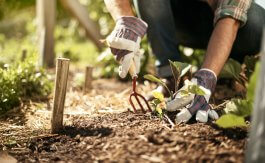
In today’s fast-paced world of technological advancements, the allure of nostalgia often beckons us back to simpler times. This sentiment is perfectly embodied by heirloom gardening tools, cherished for their enduring quality and timeless functionality. In this article, we’ll explore some of the best heirloom gardening tools that have stood the test of time, making them essential companions for any gardening enthusiast.
But first, let’s talk about antique hand tools—the ones passed down from generation to generation. Antique hand tools evoke a sense of history and nostalgia in the garden. Tools like scythes, sickles, metal rakes, and machetes have a timeless relevance. Passed down through generations or found at yard sales, these heirlooms connect us to the past while remaining incredibly functional in the present. We’ll talk more about finding these treasures out in the wild, but first let’s talk about the types of heirloom-quality gardening tools that are gift-worthy.
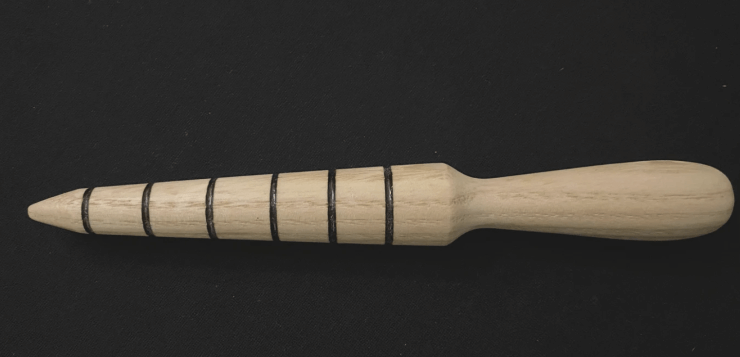
Source: Etsy
1. Wooden dibber
The wooden dibber is a classic gardening tool that has been cherished for generations. Its simplicity lies in its design—a wooden handle with a pointed end used for making holes in the soil for planting seeds and bulbs, which also has notches to indicate depth. The tactile feel of wood and its natural aesthetic make the wooden dibber an essential heirloom tool for any gardener.
To find a good heirloom quality dibber, I suggest looking to your local woodturner, or even finding an artisan on Etsy. Walnut, ash, birch, and oak are all strong woods for this type of tool (and all wooden-handled tools, really.) I like the one above, made of ash wood (the same stuff they use to make baseball bats), which is crafted by the husband of a Master Gardener. The one by Fisher Blacksmithing, made of walnut, is a nice one too.
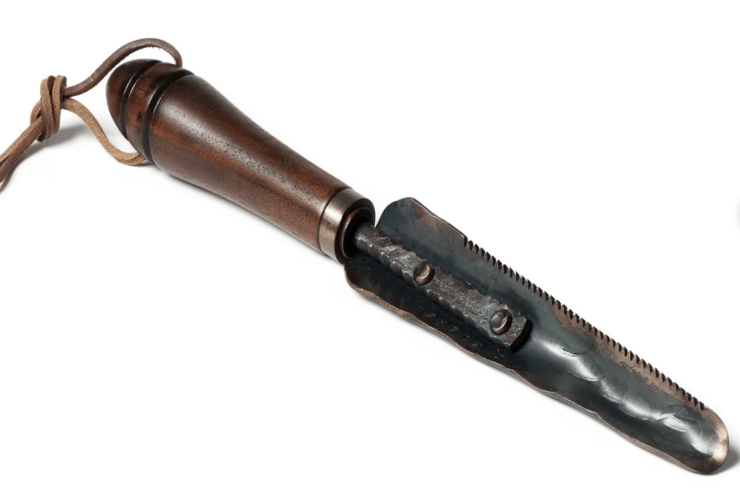
Source: Etsy
2. Hand-forged trowel
Every gardener deserves a good and long-lasting trowel. For something gift-worthy, I’d again seek out a local blacksmith, but an easier route is to check out the hand-forged garden tools designed and created by Tuli Fisher in Bozeman, Montana. In particular, I love his narrow trowel (see above) because it acts a bit like a hori-hori knife with its serrated edge, which can be used for quickly cutting twine and things, and also like a dibber! Plus, it has a super durable black walnut handle. I also love the beautiful full-sized trowel he makes, and I’m secretly coveting this leather-wrapped walnut-handled one.
For something more affordable, the Wilcox 11-inch All-Pro Trowel is a modern classic, revered for its durability and versatility. Its sturdy construction and ergonomic design make it a favorite among gardeners for digging, planting, and weeding tasks. While not a traditional heirloom, its reputation for longevity is well-deserved.
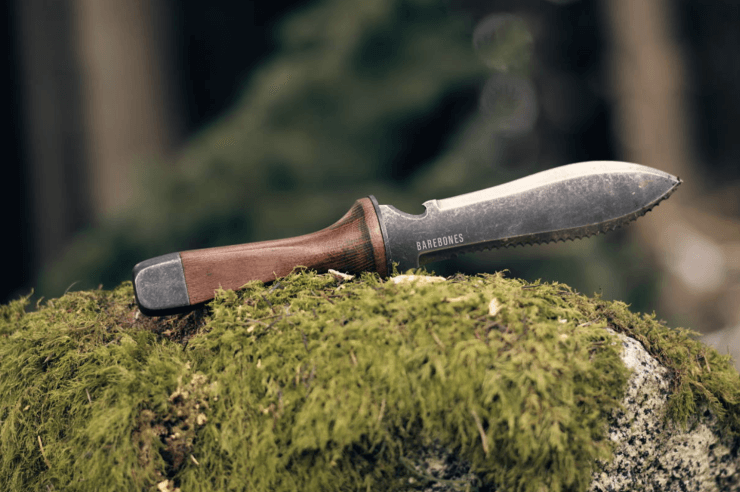
Source: Barebones Living
3. Hori hori knife
Hori hori roughly translates to “dig, dig.” For those who appreciate traditional craftsmanship, the hori hori knife with a wooden handle is a must-have. Get one with full tang, meaning the blade is the length of the handle, which ensures durability. It’s a versatile tool for digging, cutting, and weeding. My dream hori hori knife is this $759 Niwaki Hand-Forged Damascus Steel Hori Hori. That said, any Niwaki will last a long time and is definitely heirloom quality. There is one for under $20 on Amazon and it will last forever. But for gift-giving, you’ll win the heart of any gardener with a Barebones Ultimate Hori Hori (see above). You’ll get a smooth and durable walnut handle, a heat-tempered 6 3/4-inch pointed blade with a rust-resistant doubled edge that’s marked so you can see planting depths—and added twine cutter that doubles as a bottle opener.
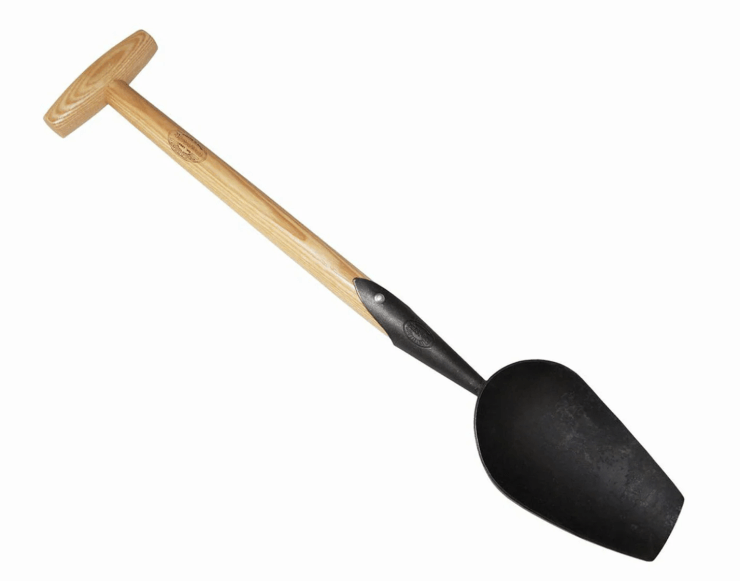
4. Compost digging scoop
A compost scoop is a great tool to invest in, especially if it’s multi-functional. The DeWit Compost Digging Scoop serves as the ideal instrument for blending and oxygenating your compost. Thanks to its generously sized scoop, it effortlessly retrieves ready compost for your garden. Its sturdy blade boasts a sharp leading edge, making it equally proficient for planting and scooping. Its length also makes it a convenient choice for raised bed gardening. Crafted from tempered boron steel and featuring an ash hardwood handle, this tool comes with a lifetime guarantee!
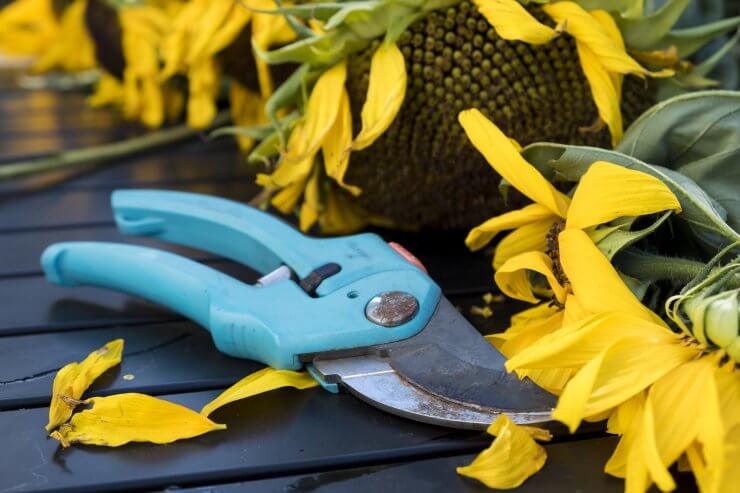
5. Bypass pruners
Bypass pruners are your go-to pruners for most things in the garden. They’re called bypass pruners because the blades literally bypass one another which gives you a clean cut without any crushing of the plant on its way through. You can cut stems or stalks of any vegetable comfortably up to a half-inch with no trouble at all using bypass pruners.
Personally, I like stainless steel pruners because they’re more resistant to rust. High carbon steel pruners are more heavy-duty and have a certain stickiness resistance because they’re coated, but rust is such a huge annoyance to me that I’d rather wash sap off a pair of stainless steel pruners than deal with rust in the middle of my first summer with a new pair.
Felco is a brand that seasoned gardeners love and you will get decades of use out of a Felco Model 2 (around $60). Felco will also repair your pruners if they break. I do find them to be pretty big in my hand, and the Felco 7 is a better fit for smaller hands. Another favorite brand is Japanese-made Okatsune. For a smaller everyday pair of bypass pruners, the small Okatsune 101 is perfect to me. You can also get bigger ones like the 102, 103, and 104 for larger hands and garden demands. A lot of people consider them the Rolls Royce of shears, though their price points are about the same as Felco, if not slightly less. To compare the two, the Felco 2 has a bit of an annoying locking mechanism that over time can sometimes swing and lock your shears while you’re using them, and the Okatsune has really simple functionality. I’ve heard other gardeners tell me they’ve been using their Okatsune for years without ever needing sharpening because Japanese steel is so strong (also why many enjoy them for kitchen knives).
Brands that create heirloom gardening tools
- Torx branch cutter: The Torx branch cutter is a reliable choice for pruning and shaping trees and shrubs. Its durability and effectiveness have made it a favorite among gardeners for years, making it a valuable addition to any heirloom tool collection.
- Baker Creek CobraHead hand hoe: Baker Creek offers an excellent CobraHead hand hoe tool for weeding, amongst other things.
- Ames spading forks: Ames is a reputable brand known for producing reliable gardening tools. Spading forks from Ames, whether short or long-handled, are highly regarded for their functionality and durability.
- Meadow Creature broadfork: The Meadow Creature broadfork is a favorite among gardeners who value eco-friendly and efficient gardening. This tool minimizes soil disturbance while allowing for better aeration and root growth.
- Red Pig Garden Tools: When it comes to modern heirloom-quality tools, Red Pig Garden Tools stands out for its heavy-duty construction and beautiful craftsmanship. They also have a line of gardening tools they custom-designed, like this asparagus knife! These tools are built to last, even in demanding gardening environments.
- STANLEY: STANLEY tools are often passed down through generations, bearing witness to the brand’s commitment to quality. Rakes, forks, and spades made by STANLEY can easily be 50 years old and still in excellent working condition.
- DeWit Garden Tools: Willem de Wit established his blacksmith business on April 1, 1898, within a quaint village in northern Holland. Fast forward to the present day, and the company is currently managed by the fourth generation of the forging family. Their commitment to traditional craftsmanship, fused with inventive designs, has solidified DeWit as the preferred brand among gardeners, offering a wide selection of high-quality tools with lifetime guarantees.
Finding heirloom garden tools in the wild
Finding heirloom tools at antique shows and yard sales can be a rewarding experience. Look for signs of quality craftsmanship, such as sturdy handles, well-maintained metal parts, and brands known for durability. Ask sellers about the history of the tool and any maintenance it has undergone. Rust and wear can often be cleaned and restored, so don’t shy away from tools that show their age.
When shopping for heirloom gardening tools, prioritize those with no plastic components and opt for all-metal types that resist rust, unless you’re willing to commit to regular cleaning after each use. Unpainted wooden handles are a classic choice, offering a comfortable grip, but ensure that the metal collar or spine extends sufficiently over the wood. Taking a page from the craftsmanship of bygone eras, consider tools that exhibit the artistry of binding wooden handles with leather strips or twine, particularly in areas prone to flexing, preventing the wood from splitting. This time-honored technique not only enhances durability but also adds a touch of rustic elegance to your gardening experience, reminiscent of the wisdom passed down by generations of gardeners.
Caring for heirloom garden tools
Caring for heirloom garden tools is essential to ensure they continue to serve you well. Here are some tips:
- Clean and dry: After each use, clean off dirt and debris with a brush or hose. Make sure the tools are thoroughly dry to prevent rust.
- Oil the metal parts: Regularly apply a light coat of mineral oil or vegetable oil to metal parts to prevent rusting.
- Sharpen blades: Keep cutting tools sharp using appropriate sharpening tools or services.
- Wooden handles: Sand and refinish wooden handles as needed to prevent splinters and cracks. Consider using a UV-resistant deck stain to protect the wood.
- Store properly: Hang your tools or store them in a dry place to prevent moisture damage.
- Bucket of sand and motor oil: To prevent dirt and debris from sticking to your shovels and other metal tools, consider creating a simple maintenance station. Fill a bucket with sand that’s saturated in motor oil, and keep it stored in a covered area. Before and after using your tools, dip them into the sand-oil mixture. This will help clean and protect the metal surfaces.
- Metal brush: Keep a metal brush readily available in your gardening area. It’s handy for removing stubborn dirt and debris that may get stuck on your tools during use. Regularly brushing off your tools can prevent the buildup of grime and extend their lifespan.
Heirloom gardening tools have a timeless charm and a history that resonates with many gardeners. Whether passed down through generations or carefully selected for their durability and functionality, these tools are more than just implements—they are a connection to our gardening heritage. So, whether you’re a seasoned horticulturist or a novice gardener, consider adding some of these heirloom tools to your collection to make your gardening experience not only more efficient but also deeply rooted in tradition.
What are your favorite heirloom gardening tools?


 Previous
Previous

